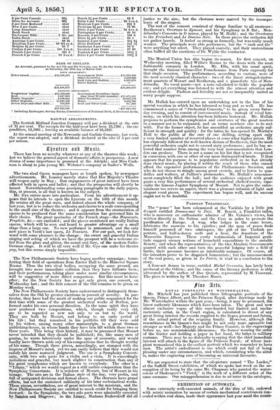• The New Philharmonic Society have begun another campaign; trans-
ferring their field of operations from Exeter Hall to the Hanover Square Rooms. Thus the two rival bodies, occupying the same ground, are Imought into more immediate collision than they have hitherto been; and their performances, taking place under more similar circumstances, will be suggestive of more direct comparison. But this must be here- after for the New Society has as xet only given one concert, on Wednesday last ; and the first concert of the Old remains to be given on Monday week.
The New Philharmonic Society have endeavoured to distinguish them- selves from the Old by greater exertions in pursuit of novelty. In par- ticular, they have had the merit of making our public acquainted for the first time with some of the greatest orchestral works of Berlioz, per- formed under his own personal direction. In the same spirit they have now produced two compositions, which, though really very old, are to be regarded as new not only to us but to the world. They are both by Mozart, and belong to an early period of his life ; but they remained in his portfolio till they were sold by his widow, among many other manuscripts, to a great German publishing-house, in whose hands they have lain till within these two or three years. This being their history, it may be presumed that Mozart never intended that they should be published; for, like many men of _genius, he wrote laboriously under the spur of necessity, and would hardly have thrown aside any of his compositions that he thought worthy -of his name. Though these pieces, accordingly, are stamped with the impress of Mozart's mind, yet we can easily believe that they would not -satisfy his more matured judgment. The one is a Symphony Concert- ante, with two solo parts for a violin and a viola. It is exceedingly melodious and graceful, but much slighter in construction than any of his great symphonies which are known to everybody. The other is a -"Litany,' which we would regard as a still earlier composition than the 'Symphony Concertante. It is redolent of Mozart, but of Mozart in his nonage. The airs are in the Italian style of. the day., very prolix, and full of antiquated divisions and formal closes. The choruses have grand effects, but not the sustained sublimity of his later ecclesiastical works. These pieces nevertheless, are of great interest to the musician, and the New Philharmonic Society are entitled to much credit for bringing them forward. In the Symphony, the two solo parts were admirably executed by Sainton and Blagrove ; in the Litany, Madame Rudersclorif did all
justice to the airs; but the choruses were marred by the incompe- tence of the singers.
The rest of the concert consisted of things familiar to all amateurs : Beethoven's Overture to _Egmont, and his Symphony in B flat ; Men- delssohn's Concerto in G minor, played by M. Halle; and the Overtures to the Freieehutz and le Domino Heir. In these pieces the orchestra did not gather laurels. It looked as strong as formerly, but was really much weaker. The principals were able performers, but the "rank and file" were anything but select. They played coarsely, and their unsteadiness often baffled all the exertions of Dr. Wylde the conductor.


































 Previous page
Previous page